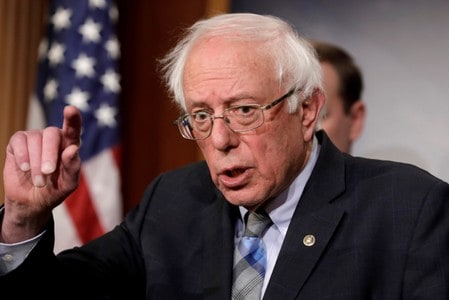By Yasmeen Abutaleb and Deena Beasley
(Reuters) – U.S. Senator Bernie Sanders this week urged regulators to allow pharmacies and manufacturers to resume distributing unbranded, lower-cost versions of a drug used to treat a rare neuromuscular disorder, according to a letter provided by his office to Reuters.
The drug is now sold at a list price of $375,000 a year by Catalyst Pharmaceuticals Inc under the brand name Firdapse. It is used to treat Lambert-Eaton Myasthenic Syndrome (LEMS), which affects about one in 100,000 people in the United States.
Shares of Florida-based Catalyst were down nearly 10 percent at $2.79 on Thursday.
The company received Food and Drug Administration approval for Firdapse in November, along with rights to sell it exclusively for several years under a designation granted to developers of treatments for rare diseases.
The drugmaker, in response to a recent query from Sanders, said its prices are in line with similar products in the industry.
Catalyst on Thursday declined to comment on the senator’s request to the FDA.
Before the launch of Firdapse, patients were able to get the same drug for free from Jacobus Pharmaceuticals, a small New Jersey-based drug company, which offered it through an FDA program called “compassionate use.”
The program allows patients with rare diseases and conditions access to experimental drugs outside of a clinical trial when there is no viable alternative.
In his Feb. 26 letter Sanders, citing the Catalyst drug’s “shocking price,” called on FDA Commissioner Scott Gottlieb to announce that the agency will not take enforcement action against pharmacies and manufacturers that were previously providing the drug to patients. Sanders also gave the letter to U.S. Health and Human Services Secretary Alex Azar in a private meeting on Tuesday.
FDA spokeswoman Jennifer Rodriguez, in an emailed statement, said the FDA has received the letter and will respond directly to the senator. HHS also said it has received the letter and will respond.
In 2012, a federal judge dismissed a lawsuit brought by K-V Pharmaceutical Co against the U.S. government seeking to ban sales by pharmacies of cheaper, unapproved versions of its drug Makena to prevent premature birth. The FDA had allowed such sales after public outcry over the high price of the newer drug.
FDA approval of Makena came years after pharmacies had already been compounding such a drug at far lower prices than Makena, using an active ingredient, hydroxyprogesterone, available without formal FDA approval.
“Catalyst may be the most recent company to exploit their monopoly after receiving FDA approval for an inexpensive old drug, but they were certainly not the first,” Sanders said in the letter.
He noted that the prices of very old and inexpensive drugs such as colchicine, vasopressin, neostigmine, and others have been raised substantially by drugmakers following FDA approval, causing needless suffering and adding to the cost of health care.
The government has intensified its scrutiny of the pharmaceutical industry and rising U.S. prescription drug prices, a top voter concern and a priority of President Donald Trump’s administration.
Both the Democratic-led House of Representatives and the Senate, controlled by Trump’s fellow Republicans, have begun holding hearings this year on the rising costs of medicines. Sanders is an independent who usually votes with Democrats.
(Reporting by Yasmeen Abutaleb in Washington and Deena Beasley in Los Angeles; editing by Michael Perry and Bill Berkrot)


